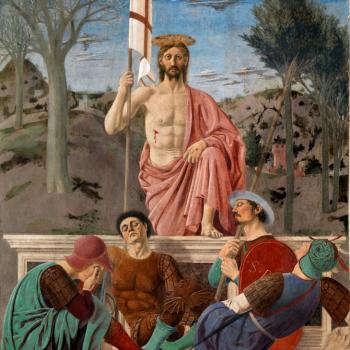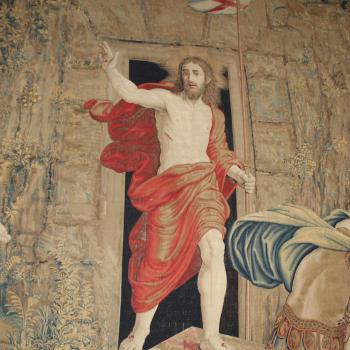The Second Sunday of Easter
Acts 4:32-35
Psalm 133
I John 1:1-2:2
John 20:19-31
Some Sundays the preacher receives too possibilities for preaching. There are so many entry points we don’t know where to start. Today’s scriptures have too much going on to cover in just one sermon. They could easily be part of a sermon series on practices of Easter. Or, if you want to deviate from the lectionary, as I have occasionally done with this scripture, you can spend two weeks on the gospel reading – one on the coming of the Spirit and breathing Spirit with Jesus today, the other on faith and doubt and how doubt is a reflection, not a denial, of faith. The word “decision” means cutting off, and we must say “no” to certain homiletic possibilities to say “yes” to others. The inspirational and adventurous preacher needs to be selective about choosing their focus among themes such as John’s Pentecost, breath prayer, believers’ authority, forgiveness, doubt and faith, faithful economics, ethical behavior, and confession of sin.
John 20:19-31is action packed and initially highlights an encounter involving Jesus and his disciples on Easter night. Night has fallen and despite the accounts of the resurrection they have heard and especially Mary of Magdala’s testimony, Jesus’ followers are still frightened, even those who viewed the empty tomb. Awe and wonder can be frightening, and we need time to bring together feelings of despair, hope, and wonder.
The disciples return to the upper room to recalibrate their spiritual GPS and discern the next steps of their journey, whether as a team or as individuals. There may even be uncertainty about whether the movement will survive. Will there even be next steps in the journey?
In that moment of hopeful uncertainty, Jesus appears to his followers and, first, proclaims “peace be with you.” Peace occurs in times of crisis as well as placid days. Peace involves a sense of God’s presence amid our pain, uncertainty, fallibility, and fear. Peace is the recognition that God is with us in all the seasons of life and will provide a way to the future when we see no way ahead. Peace widens our perspective and takes us beyond self-preservation and fear to compassion for others and love.
Then, Jesus breathes on them and says, “receive the Holy Spirit.” Jesus’ breath gives them new life. The Spirit will give them power and the authority to forgive and withhold forgiveness. Although the disciples are given authority to withhold forgiveness, the implication is that after their desertion of Jesus, their self-awareness will inspire them to forgive and accept those who, like themselves, have sinned and fallen short of God’s vision for their lives.
Jesus’ breathing on the disciples may still be present in our lives in homeopathic portions. Nothing is lost in the universe and perhaps the air we breathe contains micro elements of the breath of Jesus. Jesus teaches them a form breath prayer long before the popularly of today’s mindfulness meditation and calmer choice. Peace is just a moment away and our inhaling and exhaling can be in synch with God’s breath energizing and guiding us.
Perhaps in the course of the service, you might take a moment to teach a simple breath prayer, inviting folks to breathe in the Spirit, letting Christ’s Spirit fill them, and then exhale love and joy to the world.
There is no need to pick on Thomas today. He is both critiqued and affirmed in today’s reading. Those who believe without seeing are blessed. Thomas’ quest for certainty about the resurrection is implicitly criticized in the text. Yet, Thomas is faithful, despite his doubts. He has not experienced the risen Christ, he has no experience of the joy and ecstasy of Easter, and yet he sticks around. His doubt is aimed at belief, not skepticism. When he encounters Jesus, he believes wholeheartedly and, as the legend goes, becomes the apostle of the good news to India.
Judas’ experience reminds us that doubt is a part of faith, not be scorned but honored in our quest for a faith to believe in.
Questions are essential to faith. Cults, whether led by religious leaders or politicians, thrive on blind, unquestioning faith. It is important to question and revise our beliefs and even doctrines based on contrasting or new evidence. It is not faithlessness to reflect about the truths of Christianity and scope of revelation and salvation in light of religious pluralism and our experience of devout persons of other faiths. It is not faithlessness to question the piety that inspires devotion to a Bible-selling former president, who seems to conflate himself and American exceptionalism with God’s will and encourage the belief that he and his followers are chosen while those who differ are lost.
Jesus gives us breathing space in times of anger, questioning, and doubt. He does not compel our belief nor does he demand doctrinal subservience. He respects our doubts and questions. He breathes in and on us, giving us new life and energy to face our own trials and challenges. We need to open ourselves to divine breath and out of the spaciousness give grace and love to others. Breathe on us breath of God, fill us with live anew! Let it breathe on us!
The Epistle of John counsels followers of Jesus to walk in the light. Realistically speaking, he recognizes that we are all ambiguous spiritually and ethically. All of us sin, and all of us need confession, even when we think we are doing the right thing or choosing the best of ambiguous alternatives. Without defining ourselves as sinners, it is essential that we have a robust understanding of personal, interpersonal, and relational/social sin. We are all complicit in some of the evils we deplore. None of us is faithful on our own: our sense of righteousness is an illusion, especially if it separates the world into good and bad, and pure and impure, whether personally or politically. We need to recognize our imperfections and solidarity with “sinners,” despite our apparent righteousness. We need to rely on the grace of God to find healing and wholeness. Our brokenness is social and relational, and so is our salvation. Confession opens us to be honest before God and others, and out of that honesty receive the healing touch that allows us to walk in the light as recipients, moment by moment, of God’s saving grace.
Acts 4 describes the economics of faithful interdependence. It is certainly countercultural in its defiance of our culture’s focus on greed and consumerism. I am not sure that we can preach this practice literally in today’s USA without great confession and the willingness to recognize our complicity in the poverty and deaths of many of God’s beloved children. In many churches, the preacher and his congregants are “privileged” and benefit from certain forms of systemic injustice. In ways that defy our USA economic and political systems, the earliest members of the Jesus movement sold their possessions and insured that everyone had enough to live a good life. They were embodying the Jubilee spirit (the Jubilee year) that came with Jesus’ resurrection and the full manifestation of God’s Spirit on Pentecost. Faithfulness requires changed behaviors even in the economic sphere. (For more on Acts of the Apostles, see Bruce Epperly, “Transforming Acts: Acts of the Apostles as a 21st Century Gospel.”)
Today’s words of grace and challenge us to recognize that following Christ inspires us to countercultural behaviors. Trusting God to breathe through us enables us to let go of security. It enables us to make commitments to live more simply and share more fully. It is doubtful that we need to preach a form of biblical communalism to our congregants; we can counsel them to share the good news in every aspect of our relationships. We can also counsel them to become mindful of our nation’s and our own role in the pain and poverty of others and seek real changes that will enable others to have hopes for the future that we too often take for granted. Openness to God frees us from all forms of false security, including the security of our righteousness and economic well-being.
Today, let us breathe deeply God’s presence that inspires, gives life, and invites us to be givers and receivers of God’s good news.
+++
Bruce Epperly is a pastor, professor, and author of over eighty books, including the recently released “The God of Tomorrow: Whitehead and Teilhard on Metaphysics, Mysticism, and Mission,” “Jesus: Mystic, Healer, and Prophet,” “Process and Politics,” Spirituality, Simplicity, and Service: The Timeless Wisdom of Francis, Clare, and Bonaventure,” and “The Elephant is Running: Process and Open and Relational Theology and Religious Pluralism.”











